Czech Republic in the Horizon Europe Programme as of March 2024: More than 1,000 funded participations
04/19/2024 Author: Vladimír Vojtěch
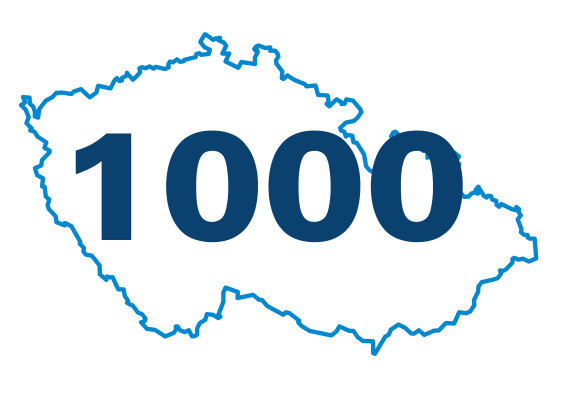
As of 26 March 2024, the European Commission's eCORDA database recorded 1,056 funded participations for the Czech Republic in 768 Horizon Europe ("HE") projects. As of the same date, participants from the Czech Republic claimed a net EU contribution of €383 million. Among the EU Member States and countries associated to the HE programme, the Czech Republic has been for a long time placed on 17th position, both in terms of the number of participations and the net EU contribution. By comparison, Poland has long been 16th in both indicators (1,349 participations with a net EU contribution of €474 million), Slovenia is 19th in terms of participation (868 participations) and 18th in terms of net EU contribution (€282 million). The ranking of the Czech Republic, but also of Poland or Slovenia, is quite consistent with the overall economic performance of these countries - in terms of GDP per capita in purchasing power parity terms, the Czech Republic is 18th among the EU Member States and HE programme associated countries, Slovenia 19th (see the map diagram below).
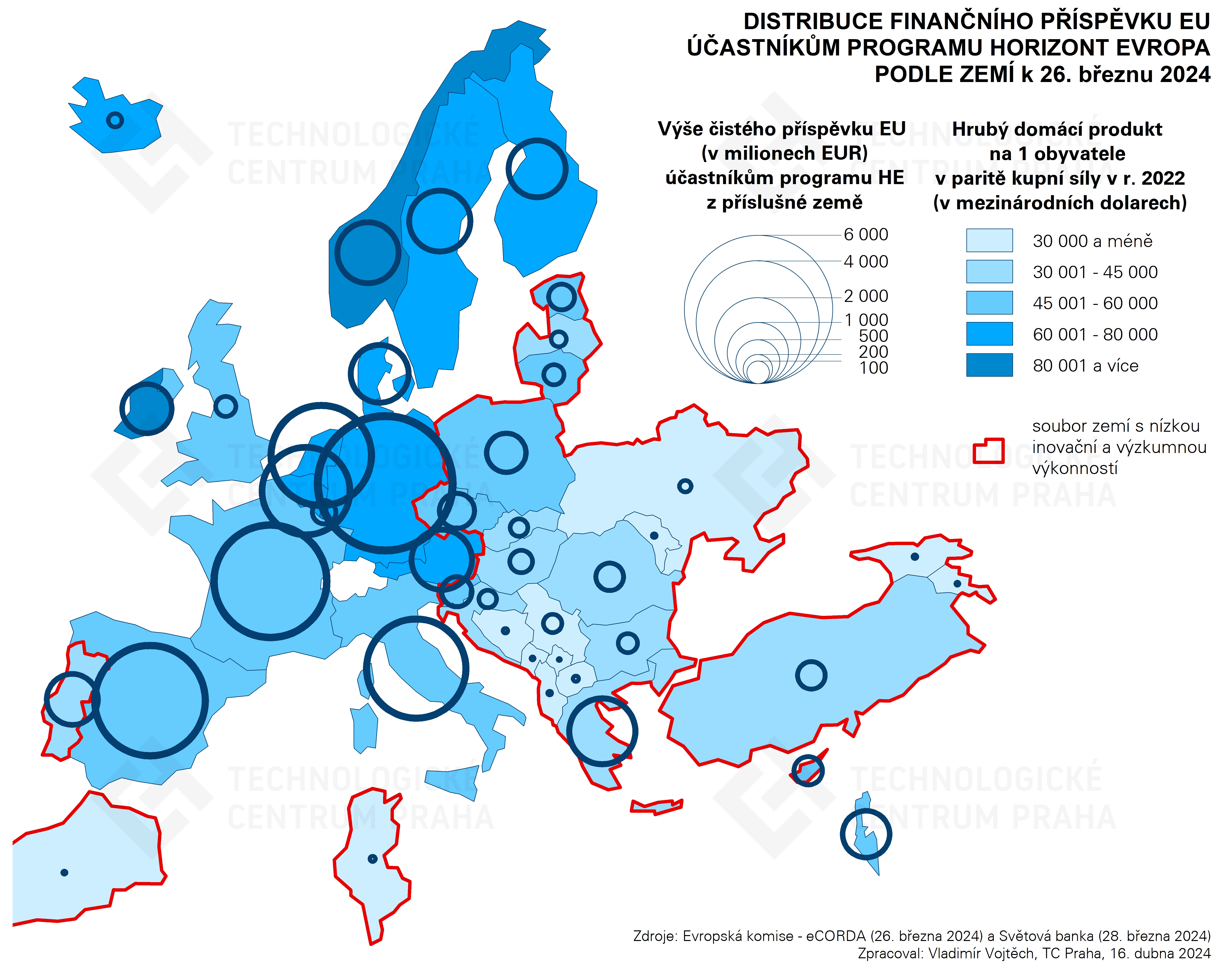
Legend: Left – net EU contribution (in € million) to participants from particular country as of 26th March 2024. Right – gross domestic product per capita in purchasing power parity in 2022 (in international dollars). Widening countries in a red outline.
Sources: European Commission (eCORDA) – 26th March 2024 and World Bank – 28th March 2024
Prepared by: Vladimír Vojtěch, TC Prague, 16th April 2024
Overall, the Horizon Europe programme recorded 79,800 funded participations in 11,700 projects with a claimed net EU contribution of €34.1 billion as of 26th March 2024. Germany (9,090), Spain (8,977), Italy (7,840), France (7,461), the Netherlands (5,135) and Belgium (4,481) reported the highest number of participations. The highest net EU contributions were claimed by participants from Germany (€5.5 billion), France (€3.9 billion), Spain (€3.7 billion), the Netherlands (€3.1 billion), Italy (€3.0 billion) and Belgium (€2.3 billion). The group of Widening countries (i.e. countries with a lower innovation and research performance) accounted for 15,800 funded participations in 4,600 projects with a net EU contribution of €5.1 billion.
The structure of the current (03/2024) participation in the HE programme is shown in the graph below. Participants from the Czech Republic reported 297 participations in Pillar I of the HE programme (Excellent Science), claiming €98 million. In Pillar II (Global Challenges and European Industrial Competitiveness), 604 Czech participations with a net EU contribution of €202 million claimed. Within Pillar II, the highest participation was reported by the Climate, Energy and Mobility cluster (173 Czech participations with a net EU contribution of €79 million claimed) and the Digital, Industry and Space cluster (160 Czech participations and €44 million claimed).
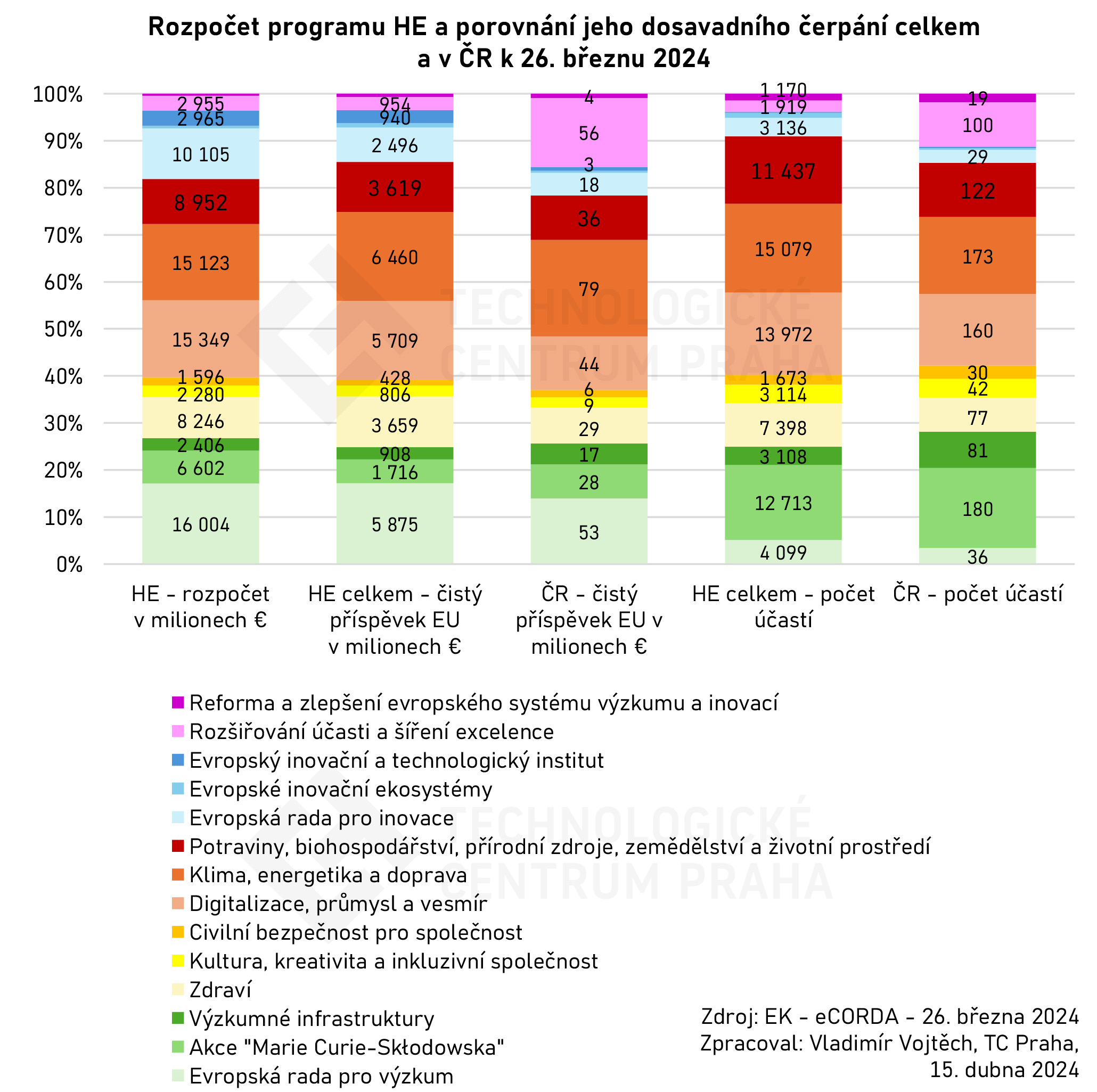
Note: Budget of the Horizon Europe Programme and comparison of its overall spending and spending in the Czech Republic as of 26th March 2024
First column – HE programme budget in € million; second column – HE programme overall net EU contribution in € million; third column – net EU contribution in € million to HE programme participants from the Czech Republic; fourth column – HE programme overall number of participations; fifth column – number of participations from the Czech Republic in HE programme.
Legend: Top-down (i.e. from violet colour to light green colour) – Reforming and enhancing the European R & I system; Widening participation and spreading excellence; The European Institute of Innovation and Technology (EIT); The European Innovation Ecosystems (EIE); The European Innovation Council (EIC); Food, Bioeconomy, Natural Resources, Agriculture and Environment; Climate, Energy and Mobility; Digital, Industry and Space; Civil Security for Society; Culture, Creativity and Inclusive Society; Health; Research Infrastructures; Marie Skłodowska-Curie Actions (MSCA), European Research Council (ERC).
Source: European Commission – eCORDA – 26th March 2024. Prepared by: Vladimír Vojtěch, TC Prague, 15th April 2024
In the Climate, Energy and Mobility cluster, 10 Czech participations each were recorded by the Clean Aviation and SESAR3 joint undertakings. Czech entities in the Clean Aviation JU claimed a net EU contribution of €19 million (i.e. a quarter of the net EU contribution in Cluster 5). In SESAR3 JU it was €8 million (i.e. one tenth of the net EU contribution in Cluster 5). Taken together, the Czech participants in the aviation JUs thus claim one third of the net EU contribution to Czech entities in Cluster 5. Honeywell International s.r.o. stands out among the Czech organisations participating in the aviation JUs, claiming €20 million in these JUs. This represents 75% of the net EU contribution to Czech participants in aviation JUs.
Europe's Rail JU also stands out in terms of Czech participation in Cluster 5. There were 12 participations from the Czech Republic with a claimed net EU contribution of €6 million. Here, AŽD Praha s.r.o. is a major participant with 4 participations and a claimed net EU contribution of €4.6 million. This represents 72 % of the net EU contribution to the Czech participants in the Europe's Rail Joint Undertaking.
Together, the aviation and rail transport JUs accounted for 32 Czech participations with a net EU contribution of €34 million. On the one hand, this represents two-fifths of the net EU contribution to the Czech participants in Cluster 5, on the other hand, this amount is equivalent to the other Pillar II clusters.
In the Digitisation, Industry and Space cluster in the Chips (Key Digital Technologies) Joint Undertaking, 33 Czech participations were reported with a claimed net EU contribution of €6 million. This is one seventh of the net EU contribution in the Cluster 4 for Czech entities. In this joint undertaking, the Brno University of Technology stands out (9 participations with a claimed net EU contribution of €2.7 million). Among enterprises, the Institute of Microelectronic Applications s.r.o. (8 participations and €674 thousand) and NXP Semiconductors Czech Republic s.r.o. (2 participations and €672 thousand).
By legal form, higher education institutions dominated among Czech HE participants as of March 2024. They participated 434 times and claimed €187 million. The largest EU contributions were claimed by Masaryk University (€48 million), Charles University (€28 million), Czech Technical University in Prague (€20 million) and Palacký University in Olomouc (€19 million). Czech enterprises and research institutions reported a similar number of participants – 250 for companies and 225 for research institutions. Enterprises claimed a net EU contribution of €91 million. Honeywell International s.r.o., which is a major participant in aviation joint undertakings (Clean Aviation, SESAR3), claimed net EU contribution of €21 million. The second major Czech corporate recipient is Chart Ferox, a.s., a producer of cryogenic equipment and systems for the storage, transport and end use of liquefied gases in Děčín (€5.9 million). Czech research institutions claimed €77 million - therein The Institute of Physics of the CAS €13 million, the Biological Centre of the CAS €8.3 million, the Institute of Organic Chemistry and Biochemistry of the CAS €7.4 million, the Institute of Biotechnology of the CAS €4.6 million and the Institute of Molecular Genetics of the CAS €4.3 million.
Project coordination plays an important role. As of March 2024, 172 projects were coordinated by Czech entities. For these projects, they have claimed a net EU contribution of €161 million. This is two fifths of the total net EU contribution claimed by Czech participants. Coordinators were most represented among higher education institutions and research institutions, with the coordination of projects bringing them around half of their net EU contribution.
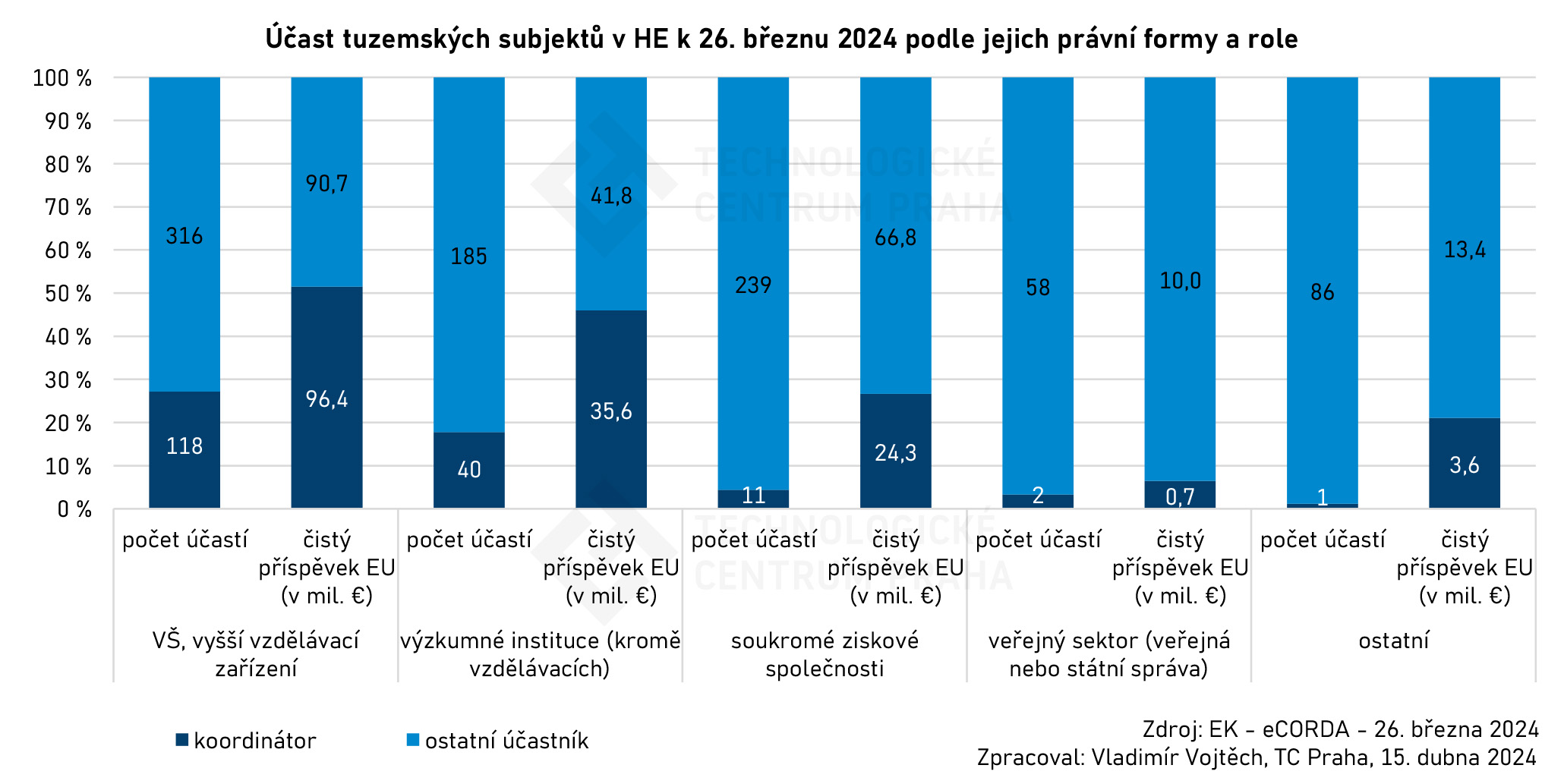
Note: Participation of Czech entities in the HE programme as of 26th March 2024 according to their legal form and role
Form left to right – higher education institutions (number of participations, net EU contribution in € million), research institutions (number of participations, net EU contribution in € million), private for-profit companies (number of participations, net EU contribution in € million), public bodies (number of participations, net EU contribution in € million), other institutions (number of participations, net EU contribution in € million).
Dark blue: coordinators; light blue: other participants
Source: European Commission – eCORDA – 26th March 2024. Prepared by: Vladimír Vojtěch, TC Prague, 15th April 2024
The regional perspective and the structure of participants in each region remain stable. The highest net contribution is claimed by participants from Prague (€192 million) and Brno (€91 million). As of March 2024, participants from the districts of Olomouc claimed €20.3 million, Prague-West €10.8 million, České Budějovice €10.3 million and Ostrava €10.1 million. Prague is home to three-fifths of the enterprises and research institutions claiming EU contribution in the HE programme. The Prague and Brno higher education institutions participating in the HE programme claim a similar amount of net EU contribution (€72 million each, i.e. 40% each of the net EU contribution to domestic HEIs).
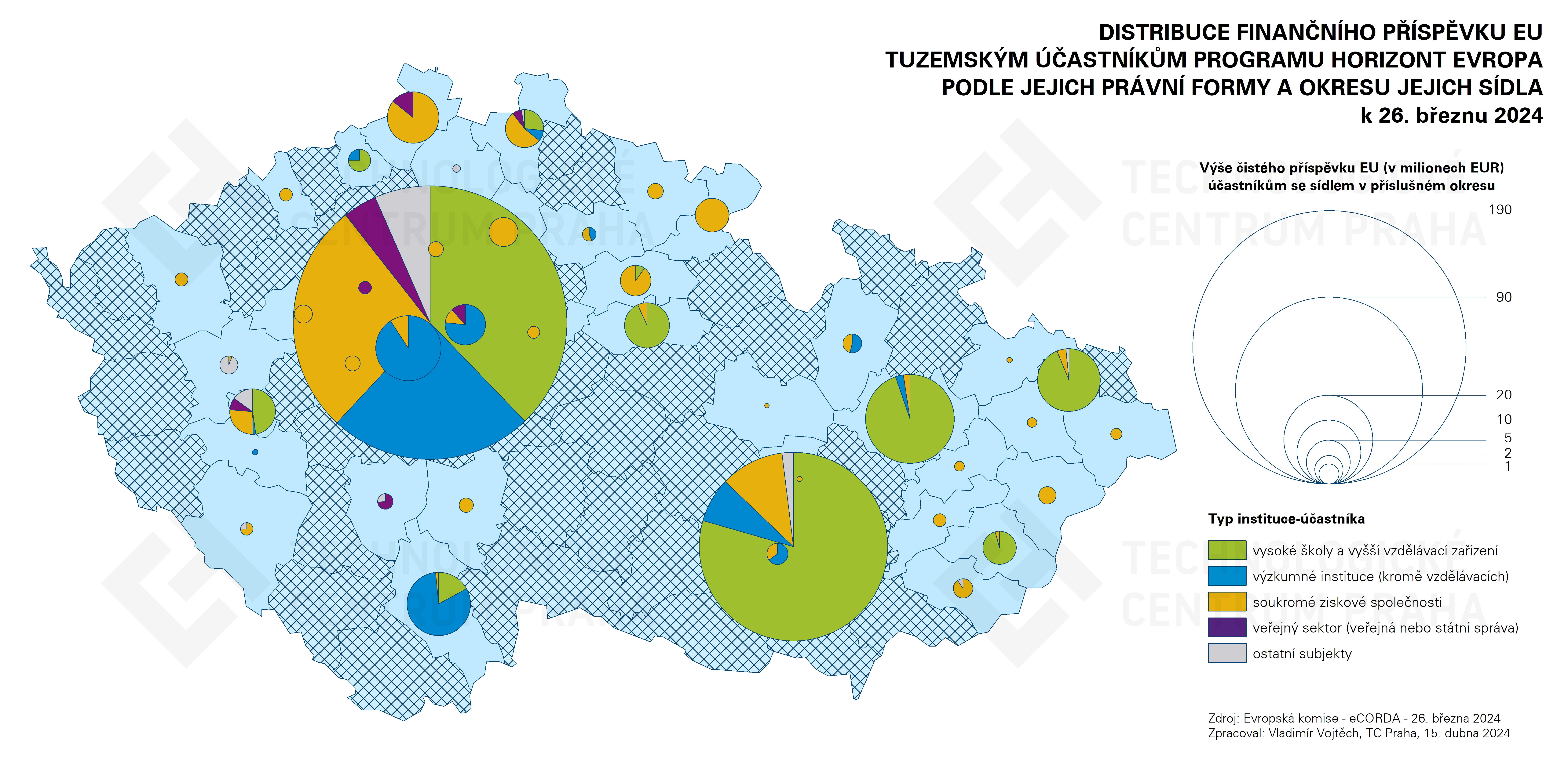
Note: Regional distribution of net EU contribution to Czech participants in HE programme as of 26th March 2024 according to their legal form and district of their seat
Legend: Net EU contribution (in € million) to Czech participants residing in particular district. Legal type – green: higher education institutions; blue: research institutions; yellow: private for-profit companies; violet: public bodies; grey: other institutions
Source: European Commission – eCORDA – 26th March 2024. Prepared by: Vladimír Vojtěch, TC Prague, 15th April 2024
At the end of this contribution, a brief mention of the participation of Czech entities in the HE project proposals should be added. Czech participations were recorded 4,683 times (in 3,480 projects), 1,057 of them as coordinators. The net EU contribution requested in project proposals by Czech entities amounted to €2.0 billion.
Summary:
As of March 2024, the Czech Republic reported 1,056 funded HE participations with a claimed net EU contribution of €383 million. It maintains its long-standing position among EU Member States and countries associated to the HE programme. Domestic participants are dominated by universities - in particular universities based in Prague and Brno. Businesses and research institutions are similarly represented, with 60% of both types of organisations participating in the HE programme based in Prague. Project coordination plays an important role in the domestic participation in the HE programme, providing universities and research institutions with half of their net EU contribution. The participation of Czech organisations in EU Joint Undertakings on chips, aviation and rail transport is also important.
Author: Vladimír Vojtěch, TC Prague, vojtech@tc.cz, 18th April 2024
